In the last BookNotes post I reviewed Practices of Love by Kyle David Bennet. It is a book about practicing the spiritual disciplines for the sake of the world. I also noted two other books that remind us of this connection between our inner and outer lives, so to speak, between spirituality and social concerns. John Armstrong has just given us a profound study of the nature of love in his long-awaited Costly Love and a wonderful, Anglican pastor, Chris Webb, wrote what has become one of my favorite recent books on formation called God Soaked Life. These are good guides, walking with us into a richer and more faithful religious life.
Bennett summarizes helpfully much of his Practices of Love book in the last chapter called “Who’s Afraid of Love?” which I wanted to share, here:
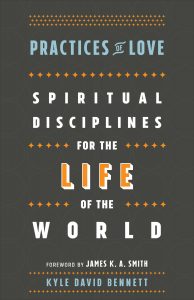 In this little book, I have tried to show that there is a horizontal dimension to spiritual disciplines, which we tend to overlook, ignore, or avoid. I have suggested that looking at spiritual disciplines from the side us how these practices capitalize on the everyday activities that we already do and remedy and renew the malformed ways we perform these daily deeds. When we step back and look at the big picture, we see that spiritual disciplines impact more than simply our individual habits and practices. We are whole persons who are interconnected with so many other people and things, so as these disciplines correct the habits and practices of our minds and bodies, they inevitably impact the livelihoods of others.
In this little book, I have tried to show that there is a horizontal dimension to spiritual disciplines, which we tend to overlook, ignore, or avoid. I have suggested that looking at spiritual disciplines from the side us how these practices capitalize on the everyday activities that we already do and remedy and renew the malformed ways we perform these daily deeds. When we step back and look at the big picture, we see that spiritual disciplines impact more than simply our individual habits and practices. We are whole persons who are interconnected with so many other people and things, so as these disciplines correct the habits and practices of our minds and bodies, they inevitably impact the livelihoods of others.
Along with impacting individual people and their lifestyles, our changed behavior influences the dynamics of the community of which both of us are a part. Changing routines and daily deeds cultivates a certain kind of social mind-set and an awareness of shared spaces with others. A change in our habits and practices as lovers, friends, parents, neighbors, citizens, and colleagues leads to a change in shared spaces where we take up these roles, such as our home, workspace, restaurants, parks, and schools. When we step back and look at the disciplines from this perspective, we see them as a way of living. When we do this we can fully register the impact they have in and on our world.
There are so many theologically-rich lines in this last chapter. He reminds us of the theme of the book beautifully and carefully.
For instance:
Spiritual disciplines play a central part in our sanctification as believers and in God’s renewal of all things. When seen from the side, spiritual disciplines are concrete and essential ways that God renews and revitalizes our lives and our life in society with others. God changes you and me here and now through what we do here and now. And the most basic and forceful way this happens is through the little things we do every day – our daily deeds.
Of course we can never fully register the impact a transformed way of being in the world will impact it but I suspect he meant that as we ponder this, we can more fully register the impact. We can, by thinking sideways as this book teaches us to do, at least begin to imagine the ways the practices of love will ripple out across the culture. In fact the good professor looks at a few of the ripples: he says that spiritual disciplines will reform malformed habits, they will help reconcile broken relationships, intentional practice of spiritual disciplines will help us renew distorted cultural practices in society and they might even help restore corrupt intuitions.
That’s some big ticket items right there; a lot to promise from classic Christian piety, lived out in little ways as explained afresh in a small book. But that is what is at stake and why I commend this book to you – it matters! For the sake of the world, it matters!
You might ask how all this will happen, how being shaped by prayer and Sabbath-keeping and fasting will bear fruit for the healing of lives, the renewal of workplaces, and the mending of fractured institutions. Care for the common good — a substantive, rich, and what he calls “wieldy” view of the public in a pluralistic society — develops best, he explains, by those who love. We dare not underestimate “ being people who live lives of love.”
You can see why we love this book so (and why authors like James K.A. Smith and Richard Mouw have commended it so heartily.) And I hope you can see why we offered that “buy all three for 30% off” deal, because Armstrong on love will help us understand this essential Christian notion and Webb on everyday spirituality will help us find God everywhere and – as he says in his final few chapters – push us towards “a politics of love.”
Still this is a lot to grasp, meaty, good stuff, and I wanted to offer a few more resources that might capture your attention or tickle your fancy, as you ponder resources that might inspire you further. If you just don’t want the Bennett – I can’t imagine, but I’ll try not to judge – maybe these books will scratch where it itches for you. We are trying to help form the virtues and habits and practices and witness of our readers, deepening us all through these assists from authors in the ways of God as seen in Christ. Love really does win, after all, so we would do well to study this stuff, to get on board that gospel train. Here’s some more ideas to dig deeper into God’s call and live more graciously this fall.
We have them all on sale, too. Like the last time, we’ll do extra discounts increasing as you select one, two, or all three. Mix and match this deal even with the three from last time. We hope this makes it good for you, selecting just what you need.
BUY ANY THREE — get 30% OFF
BUY ANY TWO — get 20% OFF
BUY ANY ONE — get 10% OFF
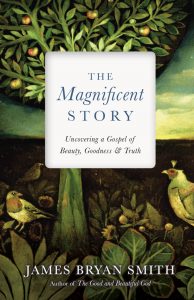 The Magnificent Story: Uncovering a Gospel of Beauty, Goodness & Truth James Bryan Smith (IVP/formatio) 22.00 I do hope you know the first three of the “Apprenticeship” series by this prolific author. Those are wonderful hardbacks with great experiences included to help us process the sanctifying material and we very highly recommend them. They were called The Good and Beautiful God, The Good and Beautiful Life, and The Good and Beautiful Community. Spiritual-formation resources are sometimes so mystical and allusive that ordinary folks can hardly imagine what they mean; sometimes they are so formulaic and rigid that only a few warm up to them. These, however, just sing – they are clear and beautiful, nicely written and loaded with transforming content. I know they have been used
The Magnificent Story: Uncovering a Gospel of Beauty, Goodness & Truth James Bryan Smith (IVP/formatio) 22.00 I do hope you know the first three of the “Apprenticeship” series by this prolific author. Those are wonderful hardbacks with great experiences included to help us process the sanctifying material and we very highly recommend them. They were called The Good and Beautiful God, The Good and Beautiful Life, and The Good and Beautiful Community. Spiritual-formation resources are sometimes so mystical and allusive that ordinary folks can hardly imagine what they mean; sometimes they are so formulaic and rigid that only a few warm up to them. These, however, just sing – they are clear and beautiful, nicely written and loaded with transforming content. I know they have been used 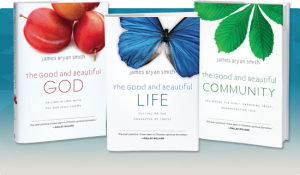 fruitfully in mainline denominational churches like Lutherans and United Methodists and Presbyterians congregations and I know they are beloved by para-church campus ministries and independent community churches and house fellowships. We love resources that we can so confidently recommend to almost anyone.
fruitfully in mainline denominational churches like Lutherans and United Methodists and Presbyterians congregations and I know they are beloved by para-church campus ministries and independent community churches and house fellowships. We love resources that we can so confidently recommend to almost anyone.
 Well, in this first volume of a new trilogy that will unfold over the next few years, James Bryan Smith (who teaches at the Friends University in Wichita, Kansas) offers a vision of life that is storied, that is shaped by a vision of the good, the beautiful, and the true. I know, and he knows, that these traits themselves have a storied past, and to write an evangelical book about them is itself a major project. And to make the call to live this better story winsome and useful for ordinary folks is going to take considerable effort; that is, I am sure he is trying hard to balanced profound substance with approachable writing – not too heavy, not to simple. This first volume, The Magnificent Story, succeeds marvelously and, as expected, I will be promoting it as vigorously as we did his Apprenticeship series.
Well, in this first volume of a new trilogy that will unfold over the next few years, James Bryan Smith (who teaches at the Friends University in Wichita, Kansas) offers a vision of life that is storied, that is shaped by a vision of the good, the beautiful, and the true. I know, and he knows, that these traits themselves have a storied past, and to write an evangelical book about them is itself a major project. And to make the call to live this better story winsome and useful for ordinary folks is going to take considerable effort; that is, I am sure he is trying hard to balanced profound substance with approachable writing – not too heavy, not to simple. This first volume, The Magnificent Story, succeeds marvelously and, as expected, I will be promoting it as vigorously as we did his Apprenticeship series.
I mention this book not only because it is surely one of the lead titles of this new season of great books but because I think it is, in many ways, a prefect follow-up to Bennett’s call to practice spiritual disciplines so that God can use us in the redemptive project of the renewal of all things. This big, cosmic, creation-regained vision that Bennett presumes is explore in The Magnificent Story from a somewhat different theological tradition (although James Bryan Smith seems to appreciate his Kierkegaard, too.) And Smith – like Bennett and his mentor the other James Smith, James K.A. Smith – seriously appreciates the narrative nature of Biblical religion. God is working out God’s purposes in Christ and that comes to us in a long story in the Bible, from creation, through Israel and exile, in the incarnation and resurrection, in the letters and stories of the early church and onward throughout the ups and downs of church history. That is, we stand amidst a story, and we take up our place being decisively shaped by it.
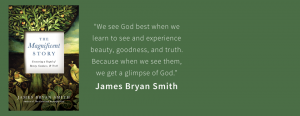
We have hardly seen a book this year that has so many rave reviews on it, one that so many authors (from across the theological spectrum) have recommended. From contemplative teacher Jan Johnson to pacifist activist preacher Brian Zahnd, from neuro-science therapist Curt Thompson to N.T. scholar Scot McKnight, from home-making mother and memoirist Jen Pollock Michel to Anglican Bishop Todd Hunter, it seems so many folks are saying how much this book means to them.
Listen to Gordon T. Smith, now president of Ambrose University in Calgary, Alberta:
If Dostoevsky is right in making the observation that ‘beauty will save the world,’ then James Bryan Smith has provided us with an exquisite exposition of what this means and how beauty is revealed in the God story. And he does so without in any way downplaying the deep fragmentation of our world; to the contrary, Smith demonstrates that it is precisely against the backdrop of this deep pain that we see and know the beauty of God and thus the salvation of God.
Here is what it says on the back cover, which I found a compelling introduction to the book:
What story have you been told about the gospel? About Jesus? About the Christian life? About yourself? Your answers to these questions will form a story that will determine how your life will go. The answers reveal your ability to trust, to love, to hope – and even your capacity for joy. Uncover the true story of beauty, goodness, and truth that will satisfy the ultimate longings of your heart.
The life story we live is often too cramped and anxious. The alternative counter-narrative we get in the Bible and church is sometimes less than what it might be – so ends up not really capturing our imagination, not really providing a counter-narrative to the American dream or whatever story we’re living for. We all know, and this books helps us see, vividly, that the gospel is a bigger, better, story, and it is true and good and beautiful. We know in our hearts (and from our appreciation of great art, good novels, engaging TV and movies) that we long for something bigger, an epic adventure, even. This very handsome hardback is thoughtful and inviting and helps us want to live into that good adventure, the beautiful fight. The Magnificent Story: Recovering a Gospel of Beauty, Goodness & Truth by James Bryan Smith is very highly recommended.
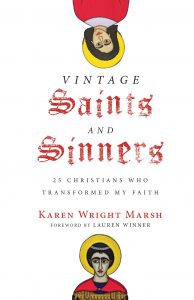 Vintage Saints and Sinners: 25 Christians Who Transformed My Faith Karen Wright Marsh (IVP) $20.00 There is so much to love about this book I hardly know where to begin. It is handsomely designed, from the cover to the matching inside flyleaves. It is well written – so far, we are all very impressed as we’ve each dipped into it. It teaches about saints we’ve heard of and some we haven’t. (In fact, one that none of knew caught our eye in the Table of Contents and as front line staffer Amy examined that chapter she quickly realized that Amanda Berry Smith, a freed slave and underground railroad activist, lived in York Pennsylvania! Wow, it isn’t every day that a local Yorker (albeit from the mid-19th century) ends up in a collection of 25 great Christian leaders you should know.
Vintage Saints and Sinners: 25 Christians Who Transformed My Faith Karen Wright Marsh (IVP) $20.00 There is so much to love about this book I hardly know where to begin. It is handsomely designed, from the cover to the matching inside flyleaves. It is well written – so far, we are all very impressed as we’ve each dipped into it. It teaches about saints we’ve heard of and some we haven’t. (In fact, one that none of knew caught our eye in the Table of Contents and as front line staffer Amy examined that chapter she quickly realized that Amanda Berry Smith, a freed slave and underground railroad activist, lived in York Pennsylvania! Wow, it isn’t every day that a local Yorker (albeit from the mid-19th century) ends up in a collection of 25 great Christian leaders you should know.
Another thing to love — there is a stellar, wonderfully-written foreword by Lauren Winner. I’ve read the whole introduction twice and just have to share this paragraph, that heads off at the pass a concern some of us may have about a book of hagiography:
In part because saints live in weird relation to the world, inviting saints into your life can be tricky. Indeed, reading about a saint can occasionally induce despair. I read about the heroism of Sophie Scholl, and the demons who accompany me on my daily rounds perk up and say, “If the standard is staring down Hitler and being guillotined on treason charges, why not admit that you’re not really trying to live like Jesus at all? You can even consistently remember to bring canned goods to church on the first Sunday of the month.” And then the demons are off to the races, explaining that I’m a pathetic excuse for a Christian and suggesting that instead of praying Evening Prayer, I rewatch the second season of House of Cards.
And then Winner says, in a move that surprised and helped me:
Here’s the thing to say to those demons (I manage to say it about one-third of the time.): I don’t read the saints in order to imitate them. I read about the saints because they show me something about myself.
Winner advises that we read Marsh’s Vintage Saints and Sinners while noticing what saints hold your attention. Some will intrigue you, some might repel you. Winner suggests that the Holy Spirit is involved in adjudicating this process. She says, “I suspect that over our lives, each of us is given two or three or four saints with whom to live in particular intimacy. Your three or four will be different from mine because you’re gifted in ways I’m not, and because you’re damaged in ways I’m not. Which saints is God offering you, to help illumine and burnish your particular gifts, and to help illumine and heal your particular damages?”
 Well, Karen Wright Marsh is a perfect guide for helping you learn about and find some saints to accompany you. She is an excellent writer and a fine historian and has been working on this book, it seems, for a long time, learning and growing into these varying visions of a life well lived for God. Marsh herself has a philosophy degree from Wheaton College and a in linguistics from the University of Virginia. She is the cofounder and director of Theological Horizons, a university ministry that has promoted theological scholarship at the intersection of faith, thought, and life since 1991. Her husband is Charles Marsh, himself a Bonhoeffer scholar and a vibrant historian of the civil rights movement. They are both involved in the UVA “lived theology” projects.
Well, Karen Wright Marsh is a perfect guide for helping you learn about and find some saints to accompany you. She is an excellent writer and a fine historian and has been working on this book, it seems, for a long time, learning and growing into these varying visions of a life well lived for God. Marsh herself has a philosophy degree from Wheaton College and a in linguistics from the University of Virginia. She is the cofounder and director of Theological Horizons, a university ministry that has promoted theological scholarship at the intersection of faith, thought, and life since 1991. Her husband is Charles Marsh, himself a Bonhoeffer scholar and a vibrant historian of the civil rights movement. They are both involved in the UVA “lived theology” projects.
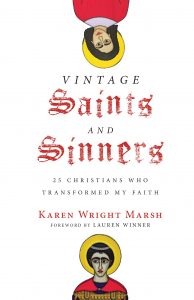 One of the things I love about this book is that it isn’t just a collection of short biographies, as good as that would be. More, this is a story of Karen Marsh’s own journey. In fact, the publisher describes it as “Narrating her own winding pilgrimage through faith.” Nice, eh?
One of the things I love about this book is that it isn’t just a collection of short biographies, as good as that would be. More, this is a story of Karen Marsh’s own journey. In fact, the publisher describes it as “Narrating her own winding pilgrimage through faith.” Nice, eh?
Further, IVP writes: “Karen Marsh reveals surprising lessons in everyday spirituality from these “saints”–folks who lived and breathed, and failed and followed God. Told with humor and vulnerability, Vintage Saints and Sinners introduces us afresh to twenty-five brothers and sisters who challenge and inspire us with their honest faith. Join Karen on her journey with the likes of Augustine, Brother Lawrence, and Saint Francis, as well as Amanda Berry Smith, Soren Kierkegaard, Dorothy Day, Howard Thurman, Flannery O’Conner, and many more. Let their lives and their wisdom be an invitation to authentic life in Christ.”
Again, like the other books we’ve recommended of late, Vintage Saints and Sinners has endorsements by great writers, public intellectuals and spiritual leaders well worth listening to. I’m smiling as I note that on the back cover we see very compelling endorsements by James K.A. Smith, Diana Butler Bass, David Dark, Soong-Chan Rah and Steven Garber. I like that Christopher L. Heuertz (who has served the poor the world over and now directs Gravity, a Center for Contemplative Activism) calls Marsh’s writing “winsome brilliants” which highlights men and women who teach us about “vocational fidelity.”
Listen carefully to Curt Thompson, who wonderfully writes:
There are few things in this world that more ably transform us than our encounters with real stories. Stories that tell of joy and shame. Of hope and anguish. Of the very hard work that leads to a world of goodness, beauty, and redemption – but not without the honest rendition of all the stumbling in the dark that necessarily accompanies such godly liberation. These are the stories that we so desperately need to hear, and they are the very stories that Karen Marsh has so thoughtfully give us… and also the story that is her own, the one that ties all the others – the reader’s not the least – into the grand narrative into which God is writing all who are willing to be included. If you want your hope to be strengthened, if you want your mind to be renewed, if you want your story to be changed, look no further: this collection of stories is for you.
 Love Heals Becca Stevens (Thomas Nelson) $15.99 This book just arrived and we are thrilled to offer it here, now. Becca Stevens has written a lot lately, and we are glad – she has a remarkable story, a respected, good ministry (Thistle Farm which is run by sexual and abuse survivors) and an real gift of creating artful, moving writing.
Love Heals Becca Stevens (Thomas Nelson) $15.99 This book just arrived and we are thrilled to offer it here, now. Becca Stevens has written a lot lately, and we are glad – she has a remarkable story, a respected, good ministry (Thistle Farm which is run by sexual and abuse survivors) and an real gift of creating artful, moving writing.
We were moved by her own gripping memoir Snake Oil: The Art of Healing and Truth-telling published by Jericho Books (and carrying a lovely endorsement by her friend the late Phyllis Tickle.) She has grappled with her own abuse and complex life journey and her call into the Episcopalian priesthood and allows us into her story. Stevens has become a  respected social entrepreneur and earned two honorary doctorates and has been named “Humanitarian of the Year” more than once. She was designated a “Champion of Change” by the White House for her work against domestic violence. Stevens has several small books of meditations and Scriptural reflection which we carry and which many folks enjoy. Her Funeral for a Stranger is very moving, well written ruminations, short essays and stories. The subtitle “Thoughts on Life and Love” doesn’t do it justice. We certainly appreciated her book about Thistle Farms (and the search for sustainably-grown and fairly-traded tea) called The Way of Tea and Justice: Rescuing the World’s Favorite Beverage from Its Violent History.
respected social entrepreneur and earned two honorary doctorates and has been named “Humanitarian of the Year” more than once. She was designated a “Champion of Change” by the White House for her work against domestic violence. Stevens has several small books of meditations and Scriptural reflection which we carry and which many folks enjoy. Her Funeral for a Stranger is very moving, well written ruminations, short essays and stories. The subtitle “Thoughts on Life and Love” doesn’t do it justice. We certainly appreciated her book about Thistle Farms (and the search for sustainably-grown and fairly-traded tea) called The Way of Tea and Justice: Rescuing the World’s Favorite Beverage from Its Violent History.
You can learn more about Thistle Farms HERE.

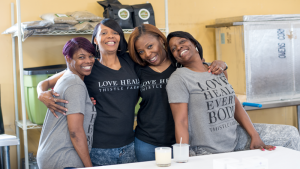
Love Heals is a beautiful book, and for the price, may be the best book bargain of the year – there are full color pages on heavy stock paper, making it almost a smaller sized coffee table book. The artwork and design is beautiful in a conventional sort of way — that is, it has the lovely look more of Simple than, say, Shane Claiborne’s colorfully edgy Jesus for President.
The warm, colorful photographs work well to supplement the warm text, the stories of love, of grace, of beauty, of goodness. Stevens opens the book with a power-house story of the day she was in the hospital having a miscarriage while her mother was in ICU with an undiagnosed terminal brain disease. “I felt lost and broken,” she writes, understandably. Through a twist of fate of God’s gracious providence, a nurse who was caring for her mother realized that Becca’s mom was, in fact, the widow of a man who as a pastor who was killed in a car wreck driving home from a pastoral visit with her, years ago. Becca’s father “had only served in that community for only one years. I didn’t think anyone in Nashville remembered him. Except, apparently, this woman.”
The story unfolds that when she was a girl, that pastoral visit by Becca’s father, killed right after visiting their home, had saved her mom and dad’s marriage. The nurse said to Becca, “I am honored to take care of your mom.”
A peace that passes understanding washed over me. I am not lost; I am found. The love my father had offered decades before was surrounding my mother and me now. I knew that even in the midst of death and brokenness, love heals.
Love heals has been the tag line of Thistle Farms for nearly twenty years. “That simple phrase holds the essence of hope and the deepest truth,” she writes.
This is essential a collection of beautifully written devotionals, showing how love heals as we attend to God’s goodness and beauty and care in various aspects of life. For instance, she invites us to realize that “Love Heals Through Creation – Recognizing God’s Love in nature” and “Love Heals with Daily Rituals – Practicing Healing Throughout Our Day.” Another chapter is “Love Heals Besides Still Waters – Learning to Find Peace.”
There are fourteen such chapters in this almost 200-page hardback, and while some are sweet and tender “Love Heals with Compassion – Nourishing Connections Between Us”, others move us into harder spaces. She calls us to global solidarity in “Love Heals Across the World: Branching into New Territory” and through hard issues in our own lives in “Love Heals on the Edges of Our Hearts—Growing Through Painful Spaces.” There are chapters about finding God’s love in grief, and during the act of forgiving. Sometimes healing happens “over the bridge of time” and sometimes love can “Heal Past Our Fears” as we walk through anxiety. She helps us let go of what weighs us down and helps us accepting God’s greatest gift of grace—God’s mercy — in gratitude.

This is a beautiful book, visually (certainly) and in terms of the writing and in the good, good, news it offers. It isn’t as culturally engaged as the thoughtful Kyle Bennett or as academically rigorous as John Armstrong’s Costly Love and it doesn’t tell the sorts of stories Karen Wright Marsh offers in Vintage Saints and Sinners. It captures the “gospel of beauty, goodness and truth” as explained by James Bryan Smith in The Magnificent Story but, unlike any of those, it is very plainly, very sweetly done, and hits the heart immediately.
Her friend and admirer Amy Grant writes nicely about Becca,
In her, I see a truly old soul in this incredibly modern package, and any conversation with Becca feels like an invitation to experience history, poetry, nature, God…When I’m reading her words, I feel like I’m tapping into this rich, ancient wisdom delivered by someone who I could just as easily spend hours chatting and laughing together with over coffee –or tea, in her case!
Grant continues: “Even things that are scary have their place in the exquisite order of the world that Becca celebrates. Love Heals is true. And in this book I’ve found a beautiful place of encouragement and hope – a meeting point for us all to experience community, healing, and love.”
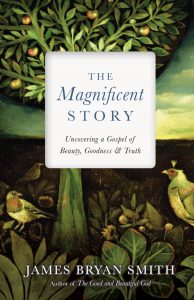
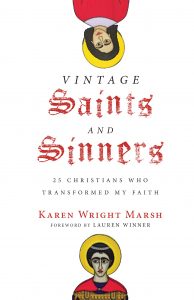

REMEMBER OUR SPECIAL DEAL:
· BUY 3 BOOKS GET 30% OFF
· BUY 2 BOOKS GET 20% OFF
· BUY 1 BOOK GET 10% OFF
BookNotes

order here
takes you to the secure Hearts & Minds order form page
just tell us what you want
inquire here
if you have questions or need more information
just ask us what you want to know
Hearts & Minds 234 East Main Street Dallastown, PA 17313
read@heartsandmindsbooks.com
717-246-3333
